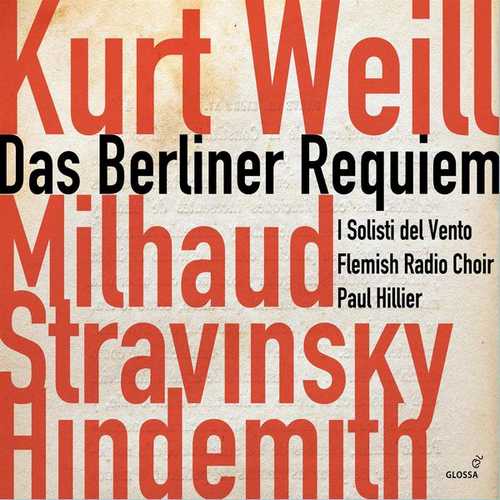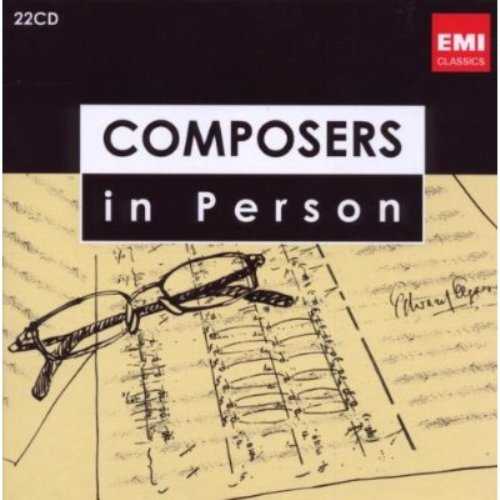
Composer: Kurt Weill, Darius Milhaud, Igor Stravinsky, Paul Hindemith
Performer: Flemish Radio Choir, Solisti del Vento, Jakob Bloch Jespersen
Conductor: Paul Hillier
Format: FLAC (tracks)
Label: Glossa
Catalogue: GCDSA922207
Release: 2010
Size: 303 MB
Recovery: +3%
Scan: yes
Weill: Berliner Requiem
01. Grosser Dankchoral (Great Thanksgiving Chorale)
02. Ballade
03. Epitaph
04. Erster Bericht uber den Unbekannten Soldaten
05. Zweiter Bericht uber den Unbekannten Soldaten
06. Grosser Dankchoral (Great Thanksgiving Chorale)
07. Weill: Vom Tod im Wald, Op. 23
08. Hindemith: Der Tod
Stravinsky: Octet for Wind Instruments
09. I. Sinfonia
10. II. Tema con Variazioni
11. III. Finale
12. Milhaud: Cantate de la Guerre, Op. 213
13. Milhaud: Cantate de la Paix, Op. 166
After Jean Cocteau issued tracts such as Le Coq et l’Arlequin (1918) and Le Rappel à l’ordre (1926), arguing against French Impressionism and German Romanticism and in favour of art for art’s sake and with prominence being given to accessibility, simplicity and structural clarity, many composers responded to his clarion call. The devastation and emotional misery caused by the First World War and the fear of an impending further cataclysm also struck hard at existing artistic certainties. Through their music Igor Stravinsky, Paul Hindemith, Darius Milhaud and Kurt Weill all endeavoured to make sense of this ‘new Europe’ which they were experiencing around them. For its latest Glossa release the Flemish Radio Choir (VRK) has selected an ideal quintet of works to demonstrate these tendencies as well as highlighting the vocal talents of this leading European choral institution. Kurt Weill’s 1928 secular mass for the dead, Das Berliner Requiem, represents the jewel in this crown, and the VRK is accompanied by I Solisti del Vento, who also offer Stravinsky’s 1923 Octet for Wind Instruments. Both ensembles are performing here under the direction of Paul Hillier, one of the leading choral directors of today.
Paul Hillier regularly appears as a guest conductor with the Flemish Radio Choir, and this Glossa SACD release preserves one of their most auspicious collaborations, with the assistance of the wind group I Solisti del Vento. Naturally Weill’s Berlin Requiem, even with the rejected “Von Tod im Wald” included, doesn’t add up to a full CD, so Hillier and the Flemish have developed some well-informed choices for filler; Hindemith’s brief chorus Der Tod (1932), Milhaud’s Cantate de la guerre (1940), and Cantate de la Paix (1937) and, unusually, Stravinsky’s famous Octet for wind instruments (1923), as performed by I Solisti del Vento.
The SACD recording is crystal clear, wide open, and very full, though in some brief passages the winds overbalance the chorus. It is a very good Berlin Requiem though, especially when compared to Phillippe Herreweghe’s rather bland and faceless 1992 recording for Harmonia Mundi. One wonders, though, if they could have broken with tradition and not included “Von Tod im Wald;” although it is included in the published score for Das Berliner Requiem, Weill turned it out of the work as incompatible and this does seem to be one of the few genuine duds in his worklist. The brief Hindemith chorus is gorgeous and very well done; it’s the best thing on this disc. A highly desirable aspect to this disc is the prospect of hearing Stravinsky’s Octet for winds in SACD sound; however, I Solisti del Vento’s performance is an object lesson in why one doesn’t turn to choral albums in order to obtain wind works; this reading lacks snap and Stravinsky’s gentle sense of syncopation in the piece, transitions are ragged, and tempo choices often well off the mark.
That leaves the Milhaud choruses, both very rarely done. Female singers take the place of the children’s chorus in the Cantate de la Paix; otherwise, these are serviceable though not outstanding performances of these pieces. There is some minimal issues with the locus of pitch, which shifts around in some spots, none too surprising given Milhaud’s harmonically oblique and wandering approach in these works. Glossa’s Kurt Weill Das Berliner Requiem is a little below Hillier’s usual standard in terms of transparency and efficiency, but the title work and the Hindemith are good enough that it makes this one worth owning for devotees of European modern music between the wars.



